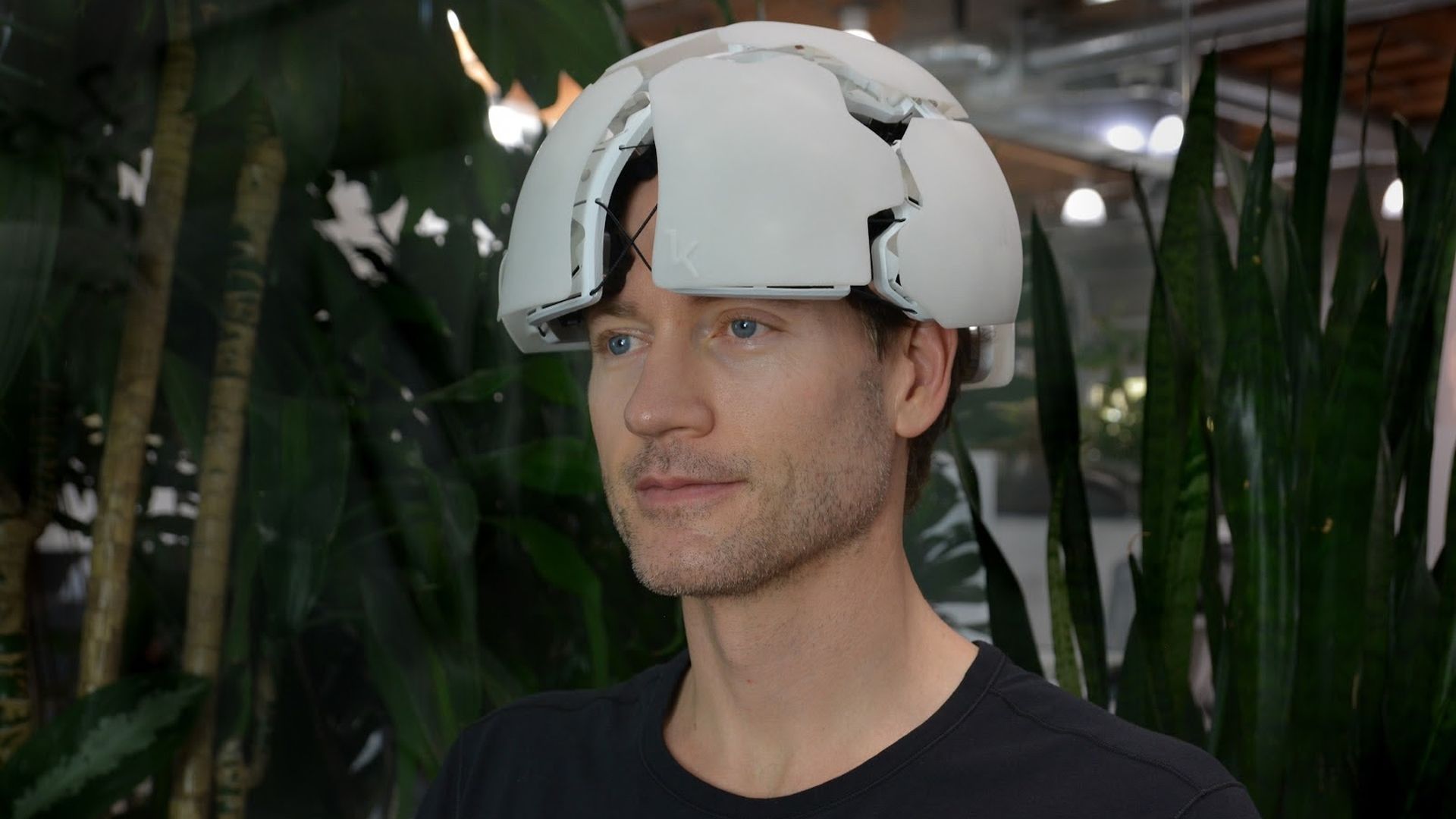| | | | | | | Presented By Babbel | | | | Axios Future | | By Bryan Walsh ·Jan 16, 2021 | | Welcome to Axios Future, where I challenge you to a danceoff with an RNA molecule. (See item #4) Today's Smart Brevity count: 1,836 words or about 7 minutes. | | | | | | 1 big thing: America is anxious, angry — and well-armed |  Data: FBI; Chart: Andrew Witherspoon/Axios Firearms background checks in the U.S. hit a record high in 2020. The big picture: This past year took our collective arsenal to new heights, with millions of Americans buying guns for the first time. That trend coincides with a moment of peak political and social tension. By the numbers: According to FBI statistics, more than 39.5 million firearms background checks were processed in 2020, by far the most since the agency began keeping records in 1998. - Nearly 4 million checks were processed in December alone — the single busiest month ever — and the total for 2020 was almost 40% higher than in 2019, which had been the previous record-holder.
The catch: FBI firearms background checks are an imperfect metric for gun sales — they're also carried out during applications that don't involve firearms purchases, like for a concealed carry permit — but with no other federal data for tracking sales, they're considered the best existing indicator. Be smart: While background checks have increased nearly every year over the past decade, what happened in 2020 goes beyond the sheer scale of the surge. - In the past, sudden spikes in firearms sales were generally prompted by concerns about tightening gun control laws, but 2020's surges seem to be connected to more general fears.
- March — the month when pandemic restrictions snapped into place — saw what was then the biggest month on record, only to be eclipsed in June during the peak of the protests around George Floyd's murder.
- Nor was 2020's increase simply a matter of existing gun owners expanding their arsenals. The National Shooting Sports Foundation (NSSF) estimates nearly 5 million Americans bought a gun for the first time last year.
- And it's across the political spectrum. As Politico reported in October, a number of those new gun buyers include Democrats and voters who said they were opposed to President Trump but still feared for their own safety.
Of note: A fascinating study published in JAMA last week surveyed thousands of Californians and found a notable rise in fears about violence because of the pandemic — especially worries about lawlessness — with a resulting increase in firearms acquisition and less secure storage of guns. - According to statistics compiled by the reporter Jeff Asher, the murder rate was up 36.7% in 57 reporting areas through September, with big cities like Los Angeles, Chicago and New York all seeing increases higher than 30%.
Context: These numbers stand against the backdrop of the insurrection at the Capitol on Jan. 6, and more general fears about growing political violence. - As more details are reported about the insurrection, it's becoming clear that police officers' initial reluctance to engage the rioters at the Capitol was likely due at least in part to the fact that many of them were clearly well-armed.
What they're saying: "The potential for chronic political violence in the United States is rising," says DJ Peterson, president of Longview Global Advisors. Yes, but: Whatever political violence is in store, the U.S. is unlikely to end up like other countries that have been torn apart by civil war, in part because the American military — even though it has real problems with right-wing extremism within its ranks — remains nonpolitical and capable of countering any insurrection. |     | | | | | | 2. Former UN climate head joins Impossible Foods |  | | | Former UN climate negotiator Christiana Figueres at the Collision 2019 conference. Photo: Sam Barnes/Sportsfile via Getty Images | | | | Christiana Figueres, an architect of the Paris climate agreement, will be joining the board of alternative protein startup Impossible Foods. Why it matters: Figueres' move is a sign of the growing importance of the alt-protein sector and an acknowledgement that solving climate change needs to include addressing food and agriculture, as well as energy. What they're saying: "[Figueres'] experience and insights into working with the global community on climate change solutions will be invaluable in our fight to save the planet," says Impossible Foods CEO and founder Patrick O. Brown. Background: Figueres, a former Costa Rican diplomat, oversaw the UN's main climate change body, the United Nations Framework Convention on Climate Change, from 2010 to 2016, including the negotiations that led to the Paris Agreement. - Since leaving the UN, she's served on the board of the Spanish energy and infrastructure company Acciona and founded the environmental advocacy group Global Optimism.
Details: Figueres tells Axios she sees Impossible Foods — which makes plant-based protein products, including the Impossible Burger — and the food industry more generally as "one of the main levers of change" on global warming. - "The consumption of animal products — and especially the consumption of beef — is detrimental to personal health as well as planetary health, because of embedded deforestation," she says. "Impossible Foods is a company that understands the health argument and the climate argument."
- Figueres also views alternative protein products like the Impossible Burger — which aims to replicate the taste and feel of meat without the beef — as part of a larger case that carbon emissions can be cut without demanding untenable levels of consumer sacrifice.
"Climate action isn't just a burden. You can eat protein, but do so in a healthy way." — Christiana Figueres What to watch: Whether Impossible Foods can continue to bring its price down to compete with conventional meat. - Last week the company reduced wholesale prices by about 15%, making the lowest wholesale price for the Impossible Burger $6.80 a pound, compared to $5.32 a pound for beef patties.
The bottom line: With the plant-based meat market projected to grow $85 billion by 2030 according to one analysis, consumers seem ready to be persuaded. |     | | | | | | 3. Hesitancy lingers around the COVID vaccine |  | | | A man in Nevada receives a COVID-19 vaccine shot on Jan. 14. Photo: Ethan Miller/Getty Images | | | | Even as government websites crash under the pressure of demand for the COVID-19 vaccine, surveys show many Americans — including health care workers — still have their doubts. Why it matters: Unless lingering skepticism about the COVID-19 vaccine is dispelled, achieving herd immunity will be a challenge — even with improved distribution. By the numbers: In the first survey exclusively focused on vaccine hesitancy among U.S. health professionals, Surgo Ventures reported on Friday it polled 2,500 health care workers and found that of the 53% who had been offered the shot, 15% said they refused to take it. - Health care workers at long-term care facilities — home to the populations most vulnerable to COVID-19 — were less likely to say they'd get the vaccine than workers at hospitals.
- The big picture: An international poll released by Reuters on Friday found less than half of Americans polled said they would definitely be willing to take a COVID-19 vaccine when offered — a much lower percentage than most other countries.
Be smart: It may seem unnecessary to worry about vaccine hesitancy at a moment when the biggest problem seems to be getting shots to the millions of Americans who very much want to get vaccinated. - But as much as 80% to 90% of the population may need to achieve immunity through either infection or vaccination to fully curtail the pandemic, which will mean convincing a large proportion of those expressing hesitancy now to get their shots.
Yes, but: The good news is the Reuters poll found even in the U.S., only about a quarter of those polled said they would definitely not get the vaccine, which means a large chunk should be convincible with incentives and better messaging. - The bad news is there are active efforts to spread disinformation about the COVID-19 vaccines.
- On Friday the European Medicines Authority revealed that an ongoing investigation into a cyberattack found evidence that "correspondence has been manipulated by the perpetrators prior to publication in a way which could undermine trust in vaccines."
|     | | | | | | A message from Babbel | | Start speaking a new language in three weeks | | |  | | | | In 2021, let language take you places with Babbel. The background: This language learning app gives you bite-sized, manageable lessons in a variety of languages. It'll have you speaking the basics in three weeks. Sign up today and get 60% off. | | | | | | 4. The dance of RNA | | A computer model of RNA in the process of folding. Credit: Julius Lucks/Northwestern University Scientist have used data from RNA folding experiments to create videos that show how the nucleic acids fit themselves into living cells. Why it matters: RNA folding is fundamental to the process of life, and the data-driven movies allow researchers to visualize how the process works, which could help them better understand RNA-driven diseases. What's happening: In a study published Friday in the journal Molecular Cell, researchers led by Julius Lucks at Northwestern University created a platform that captured data about RNA folding as the RNA was being made. - That data was fed into computer models that could generate videos animating the process of RNA folding, like the image above.
Details: During the process of folding, an RNA molecule transforms from its disordered natural state to a functional conformation. - The specific functions of RNA, proteins and other molecules require specific three-dimensional structures, and the better scientists understand how folding works, the better they'll be able to understand when and why it goes wrong.
The bottom line: The dance of life has never felt so literal. |     | | | | | | 5. Worthy of your time | | The "megascale" structures that humans could one day build (Anders Sandberg — BBC Future) - From sea-spanning hydroelectric dams to space elevators, a fun survey of the biggest engineering projects humans have ever dreamed.
What's wrong with the way we work (Jill Lepore — The New Yorker) - Americans work more hours than their counterparts in peer nations, and too often, they get little for it.
On the origins of SARS-CoV-2 (Angela Rasmussen — Nature) - As the long-delayed investigation of the emergence of COVID-19 in China finally begins, a virologist argues that we need full answers to defend ourselves against the next pandemic.
Why scientists want to shorten the minute to 59 seconds (Caroline Delbert — Popular Mechanics) - Surprisingly, it's not so we can all get through this year faster.
|     | | | | | | 6. 1 far-out thing: This is your brain on psychedelics |  | | | Kernel founder and CEO Bryan Johnson wearing the neuroimaging device. Photo: Kernel | | | | A life sciences company that focuses on psychedelic therapeutics is partnering with a startup that makes a cutting-edge neurointerface. Why it matters: Being able to quantify brain data in real time during psychedelic trips could help speed clinical trials for the drugs. What's happening: Earlier this week Cybin announced an agreement with the neurotech startup Kernel to use its Flow neurointerface in upcoming clinical work on psychedelic drugs like LSD and psilocybin. - While psychedelics have shown success in treating mental health disorders like depression in small trials, the drugs are difficult to study — and not just because they remain mostly illegal in the U.S.
- Self-reported data about the effect of psychedelic therapeutics on mental health is "somewhat subjective," says Doug Drysdale, Cybin's CEO. And that's especially true for trials that use lower doses of the drugs, which may not trigger intense hallucinations.
How it works: Kernel's Flow is a portable neuroimaging system that is worn on the head. - The device functions as a wearable fMRI, using near-infrared spectroscopy to track a user's brain blood flow and neural signals in real time.
- Cybin plans to use Flow to "look at what neural activity is occurring before, during and after psychedelic therapy," says Drysdale. "Which areas of the brain light up, and which areas are important?"
What's next: A number of neurointerface companies have been making noise in recent years — including Elon Musk's much-hyped Neuralink — but Kernel's ambitions are greater. - "We want to make brain interfaces a mainstream technology," Bryan Johnson, Kernel's founder and CEO, told me in an interview after Flow was introduced in October.
- "If we can quantify what's happening in the brain in terms of numbers, like we do with a cholesterol reading, it would change how we operate as human beings."
The bottom line: Psychedelics may help you walk through the doors of perception, but neuroimaging can tell you where you're going. |     | | | | | | A message from Babbel | | Start the new year with a new language | | |  | | | | In 2021, let language take you places with Babbel. The background: This language learning app gives you bite-sized, manageable lessons in a variety of languages. It'll have you speaking the basics in three weeks. Sign up today and get 60% off. | | | | | | Axios thanks our partners for supporting our newsletters.
Sponsorship has no influence on editorial content. Axios, 3100 Clarendon Blvd, Suite 1300, Arlington VA 22201 | | | You received this email because you signed up for newsletters from Axios.
Change your preferences or unsubscribe here. | | | Was this email forwarded to you?
Sign up now to get Axios in your inbox. | | | | Follow Axios on social media:    | | | | | |









No comments:
Post a Comment